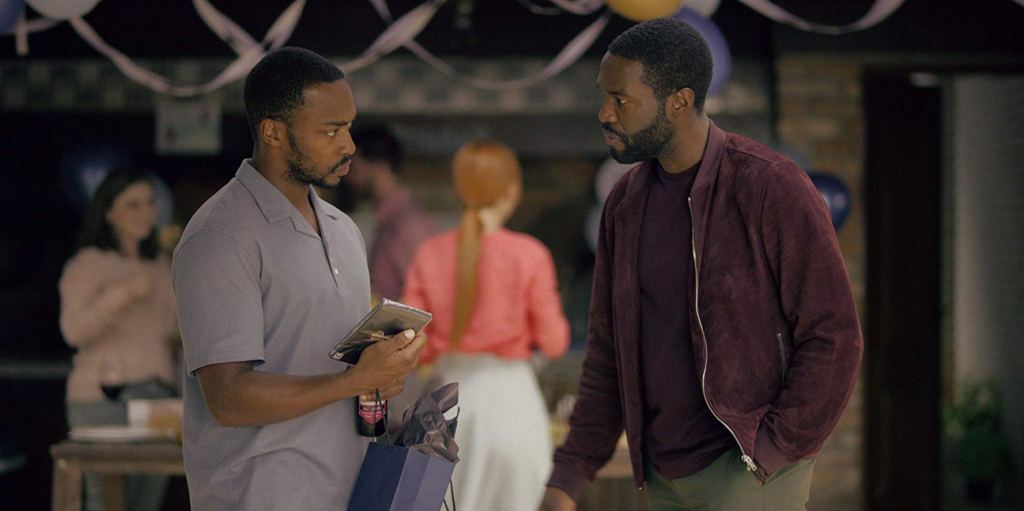Well that was, anticlimactic.
Once shorthand for searing tech-dystopia and warnings of what may have already come to pass, standalone episodes that could be deemed average television or less have now bridged the divide with that which made Black Mirror exceptional.
It’s not that Season 5 is bad, just that the points the show is making this time around, some of which have already been very well elucidated, are shallow and simplistically discernible compared to that which came before.
Commenting on the perils of over-dependence on social media (Smithereens) was concretely covered in, for instance, Bryce Dallas Howard’s series highlight Nosedive, in which circumstance multifaceted perils were better teased out to greater, discomforting effect. In season five’s second episode, still the stand-out of this three-episode order, a resonantly tragic repercussion bleeds into a very simplistic moral the likes of which has always been complemented in other Black Mirror fare such as, say, Playtest, through contrast of that both advantageous and foreboding about technological advents.
With the chapter’s forbears ruminating on technology’s varying detractions, Smithereens conversely highlights something singularly instructive, it being ‘one thing you shouldn’t do;’ week’s lesson learnt. We are also robbed of an ending, while the marked stylings of the Zuckerberg-esque tech-genius have very much been done before.
Striking Vipers, chronicling two best friends’ less than platonic use of a Street Fighter-esque virtual reality game, examines the repercussions of situating our consciousness in a machine or otherwise being let free in unreal environments. Be Right Back, White Christmas, San Junipero, USS Callister, Hang the DJ, again, Playtest, take your pick; variations on the theme have come before.
Examining however the ways in which one’s sexuality can be explored through digital forums, this author does not agree with some of the criticism that has been levelled at this particular episode; for this is the story of two individuals and their self-actualisation. Yes experiences are different for many, and Striking Vipers takes steps to highlight the legitimacy of diverse relationships rather than discounting any.
Most interesting for the colour-filled virtual realities which would have been a joy to film and location-scout, the episode ends with a simplistic, unusually upbeat tone for Black Mirror. It’s not as if the creators are beholden to deliver something cynical yet those episodes which have pursued Black Mirror’s signature conclusions have lingered for so emphatically making their point, as have too some of the more uplifting ones.
Hang the DJ, USS Callister and fan-favourite San Junipero all ended on memorably happy if morally fraught conclusions. Be Right Back set out to walk a pretty fine line in it’s final moments and did it well. The ‘happy’ endings were welcome and readily re-collectable for being surprising exceptions to the rule and reprieves from the show’s bleakness. Littering this season of three with not one but two of Black Mirror’s more blatantly positive, shoehorned conclusions not only sacrifices the established, distinct tone of the series but the pursuit of complex moral precepts that can’t be layered into such abrupt, here facile conclusions. The final moments we share with two sets of characters in season five are more centred on delivering now unexceptional, happy outcomes, as if this was what alone made San Junipero so endearing, rather than actually pursuing the likes of the profound moral lessons for which Black Mirror has become so well known.
This is seen no less in season lowlight and final addition Rachel, Jack and Ashley Too which similar to Striking Vipers questions the moralities of uploading our consciousness to, well, anything. The Disney-esque, heavily unlikely conclusion doing the instalment no favours, the shallow points made about the music industry’s own shallowness aren’t buoyed by superstar Ashley’s none too creative lyricisms, nor, counter-intuitively, the presence of Miley Cyrus.
Her casting itself (given how her music is numerously if not necessarily widely viewed) making the moral of the episode self-evident, beyond this there emerges nothing distinct about her participation that really recommends this instalment beyond a less famous or even non-professional singer otherwise having taken on the role. Cyrus evidently got to have fun with the part and that’s more than can be said for much of this chapter.
The whole season suffers too for taking place, as is sparingly the case in Black Mirror (The National Anthem, Shut Up and Dance) in what is (mostly) recognisably our time. There is a distinct lack of world building; the style of which has previously so well characterised this universe. We’re not necessarily due anything as creative as Fifteen Million Merits and budget may well have been a factor but even The Waldo Moment, situated primarily in a wholly familiar world, managed to play a little fast and loose with a distinct, foreboding none too far off future.
Preluding this season with the standalone interactive feature Bandersnatch, while the notoriety Black Mirror brings to ‘choose your own adventure’ type media must be accounted for, such form has notably been experimented with in other forums, no less than the much-beloved ‘Choose Your Own Adventure’ series. A relatively novel experience yet disappointing for the unnecessarily heavy (and tried) reversion to and reliance on that meta and ultra meta, as if there wasn’t already enough of a story to tell, those parable-ridden narratives we came to love are joining those ever-distant days when we didn’t so rely on investment in technology nor Black Mirror.
Black Mirror is now streaming on Netflix
Black Mirror on Film Fight Club

